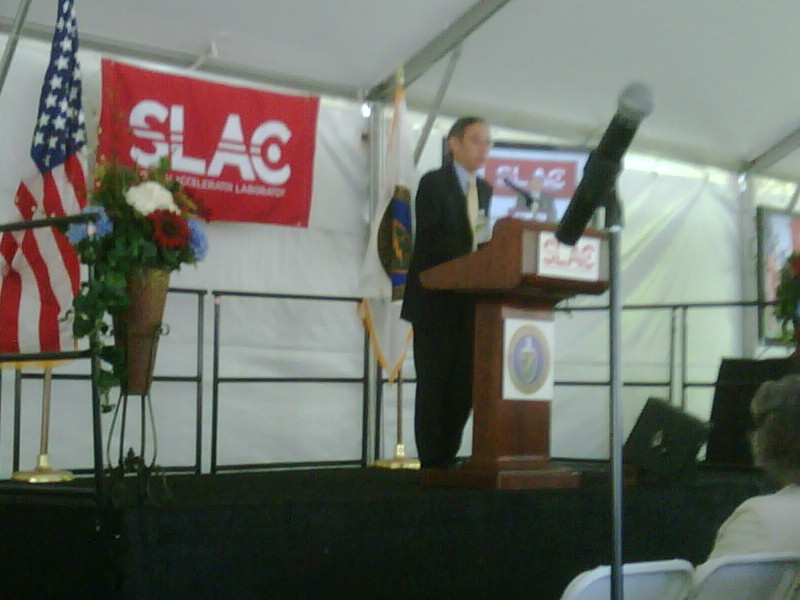Every year, scientists from all over the United States make personal visits to their elected representatives in Washington D.C. This ability to have an individual interaction to achieve collective action is a wonderous feature of our democratic society. When I first experienced this in 2003, I shared the optimisim of my colleagues when I realized that I was never more than one phone call, letter, or visit away from my elected representatives. There was no TV, no radio, no newsprint between me and them. In a democracy, only laziness stands between a citizen and their government, for a government of and by the people should never be removed by any other barrier from your reach.
Despite this collective, personal interaction, we all know that the science budget in this country is threatened by a broader, societal misunderstanding not just of science, but of the People’s role in funding science. It is not private corporations that make fundamental science, it is not private universities that broadly fund great expanses of research – it is we, the people, whose tax dollars go into the federal pot, who put up some of our hardest earned dollars to make great science happen!
I am troubled. I am troubled not just by the dropping investment in basic research in this nation in the past decade, but by the FUD and propaganda surrounding what science is funded. The President took great pride last year in his campaign in noting that science investment has been larger in this adminstration than in any other in over a decade. That’s only true in a myopic way. If you include the life sciences – medicine, biology, genetics – then yes, he has helped to make their funding grow. But the price of that investment was at the expense of the fundamental sciences: chemistry (the underpinning of all molecules, such as DNA), physics (the underpinning of all energy and matter – ALL OF IT), and mathematics (the language of Nature). Considering these most core of the sciences, without which technological innovation would grind to a screaming halt and without which the life sciences would not make fundamental progress, the investment is shrinking.
This year was no exception, from the perspective of the Executive branch. Desperate, I suppose, to demonstrate their “fiscal conservative” bend by avoiding new taxes, they proposed a 3% cut in the Department of Energy’s Office of Science (which funds 40% of this country’s basic research!); they proposed a modest increase for the NSF, far from the “doubling” budget path envisioned by this President in his first term; a 20% cut in the Depart of Defense’s scientific research, which funds mostly advanced materials science.
It was Congress that stepped in to reverse this narrow vision. The House and Senate both proposed funding for the DOE Office of Science that translated into a small increase (roughly commensurate with inflation), though at slightly different levels. The House and Senate weren’t so encouraging on the NSF, and attempts were even made to sacrifice NSF funding for homeland security programs. It was only impassioned speeches by such senior House members as Congressman David Obey (D-WI), whose own brother was in law enforcement, that turned the tide. The Defense budget was amended to greatly soften the 20% cut to science.
But here we are, one unmatched national disaster later. The President is putting the kibosh on talk about raising taxes to pay for the disaster. The projections put the financial cost of this disaster at somewhere around $200 billion, with $60 billion of that already paid out by Congress. Added to the national debt, this would increase our debt by 66%! The President is talking about proposing cuts to programs, and his Republican base of fiscal conservatives are encouraging this further slimming of government.
I’m all for slimmer government. One can make strong arguments that the hierarchical bureaucratic culture in FEMA and the Department of Homeland Security could use some trimming, as it was clearly an impedance to real-time response to Katrina (a disaster most people saw coming). Why not start with the bureaucracy itself, rather than the services the citizens have paid into the government to provide for themselves? The President has been silent about what to cut, but in the pit of my stomach I see it coming out of education (more children left in the dark, but not behind, I suppose) and science. It’s especially never been clear to me that this administration respects science (the statement by the President on evolution, the slanderous treatment of scientists working to focus policy on global warming, the cuts in basic research).
Here’s what I caution: don’t be fiscally conservative at the expense of being generically conservative. Republicans have always valued the role the federal government plays in funding things that private industry cannot. Science and K-12 education are two of those things, and are investments that make this nation a great nation. Republican’s have long trumpted the American spirit, the innovation of the citizenry, and the payoff of insight in generating new industries and wealth. You cannot have innovation without education, without hard problems to solve that force creativity. You cannot teach creativity – you introduce it like a vaccine into a child by pitting them against problems.
I think there is a strong argument that social conservatism includes maintaining that which makes this nation great, greatness that can only be maintained by the long and penetrating vision of the federal government. Private industry cannot afford to make decade-long investments in esoteric research projects whose only payoff is more knowledge and new techniques to solve other hard problems. The federal government can make this investment. And it does pay off: the internet (DARPA), medical particle accelerators and synchrotron light facilities (a spinoff particle physics), and the fact that 50% of the economic growth in the last century was due to investments in basic research. Wowsers!
The cost of a national disaster: $200 billion.
The price of a national disaster: a nation’s greatness?



